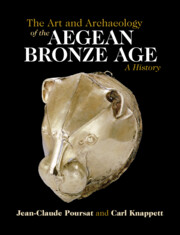Book contents
- The Art and Archaeology of the Aegean Bronze Age
- The Art and Archaeology of the Aegean Bronze Age
- Copyright page
- Contents
- Figures
- Introduction
- Part I Aegean Neolithic Art
- Part II The Art of the Aegean Early Bronze Age
- Part III Aegean Art in the Cretan First Palace Period
- Chapter 12 Artworks in Context
- Chapter 13 Minoan Architecture in the First Palace Period
- Chapter 14 Minoan Glyptic in the First Palace Period
- Chapter 15 Other Minoan Relief Arts
- Chapter 16 Artworks in the Round
- Chapter 17 Minoan Pottery
- Chapter 18 Mainland Greece and the Islands in the First Palace Period
- Part IV Aegean Art in the Second Palace Period
- Part V Aegean Art in the Cretan Second Palace Period
- Part VI Aegean Art in the Final Palatial Period of Knossos
- Part VII Aegean Art of the Mainland Mycenaean Palatial Period
- Part VIII Aegean Art at the End of the Bronze Age
- Afterword Aegean Art Through Forgers’ Eyes
- References
- Index
- Plate Section (PDF Only)
- References
Chapter 12 - Artworks in Context
The Historical Framework
from Part III - Aegean Art in the Cretan First Palace Period
Published online by Cambridge University Press: 19 May 2022
- The Art and Archaeology of the Aegean Bronze Age
- The Art and Archaeology of the Aegean Bronze Age
- Copyright page
- Contents
- Figures
- Introduction
- Part I Aegean Neolithic Art
- Part II The Art of the Aegean Early Bronze Age
- Part III Aegean Art in the Cretan First Palace Period
- Chapter 12 Artworks in Context
- Chapter 13 Minoan Architecture in the First Palace Period
- Chapter 14 Minoan Glyptic in the First Palace Period
- Chapter 15 Other Minoan Relief Arts
- Chapter 16 Artworks in the Round
- Chapter 17 Minoan Pottery
- Chapter 18 Mainland Greece and the Islands in the First Palace Period
- Part IV Aegean Art in the Second Palace Period
- Part V Aegean Art in the Cretan Second Palace Period
- Part VI Aegean Art in the Final Palatial Period of Knossos
- Part VII Aegean Art of the Mainland Mycenaean Palatial Period
- Part VIII Aegean Art at the End of the Bronze Age
- Afterword Aegean Art Through Forgers’ Eyes
- References
- Index
- Plate Section (PDF Only)
- References
Summary
The transition from Early to Middle Bronze Age, around 2100 bc, is characterised by an apparent decline on the mainland and in the Cyclades. By contrast, Crete undergoes a rapid evolution at the beginning of the Middle Minoan (MM) period which results most spectacularly in the appearance of monumental buildings that are seats of political power. At Knossos, Phaistos, and Malia, where urban agglomerations replace the villages of the Early Bronze Age (EBA), buildings of original and complex design – the palaces – are built, probably during MM IA (2100–2000 bc), and in MM IB at the latest. The so-called First Palace period (Protopalatial) thus corresponds to the first phases of the Middle Bronze Age (from MM IB to IIB), from c.2000 to around 1700 bc. Absolute chronology is based on synchronisms with the Egyptian and Anatolian civilisations, dated through texts containing kinglists.
- Type
- Chapter
- Information
- The Art and Archaeology of the Aegean Bronze AgeA History, pp. 83 - 86Publisher: Cambridge University PressPrint publication year: 2022

